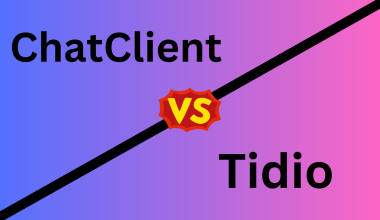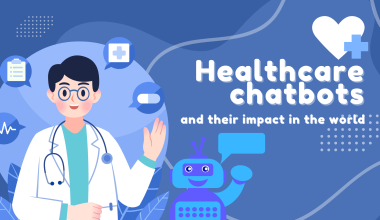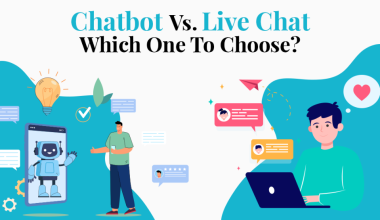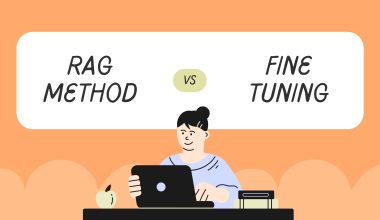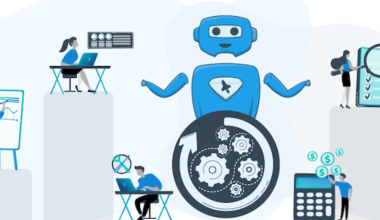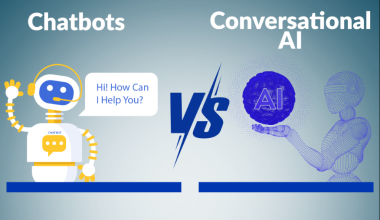Can chatbots replace customer service? In today’s digital age, chatbots have become essential helpers in all sectors, offering quick solutions, and support around the clock. But are they effective for customer support as well? Let’s learn about all the benefits of Chatbots in Customer Service, with challenges for small businesses.
10 Benefits of Chatbots in Customer Service
Chatbots are virtual assistants that use smart technology to chat with customers, solving problems quickly and giving instant replies. They can significantly reduce stress for both businesses and customers. Here are all the benefits of Chatbots in customer service:

1) 24/7 Customer Support
Chatbots are pivotal in modernizing customer service strategies. They are basically virtual bots, so they don’t need to break like a human agent. They don’t get tired and can answer queries any time of the day. We understand that human agents are important, but small businesses can’t hire many people. So, they can use chatbots to answer queries during non-working hours.
2) Quick Problem Solving
Chatbots can swiftly resolve queries! When customers seek assistance, these bots can scan through their extensive knowledge base to provide relevant information promptly. This speed in addressing issues reduces waiting times and ensures customers get solutions without delay. Also, many queries can be easily solved by bots without any human agent.
3) Instant Replies
Even if a chatbot can’t fully resolve an issue right away, it offers immediate acknowledgement and initial guidance. This is a key advantage of chatbots for customer service. Customers will receive instant responses, acknowledging their concerns and directing them to the appropriate support team. This swift engagement diminishes frustration from long response times.
4) Saving Money and Staff Morale
By handling routine tasks, chatbots can reduce the burden on human staff. This allows employees to focus on more complex or personalized tasks, enhancing their job satisfaction. Simultaneously, businesses save costs by reducing the need for large customer service teams working 24/7.
5) Language Support
Chatbots are linguistic marvels, proficient in multiple languages. They bridge language barriers, enabling seamless communication between businesses and their diverse clientele. This multilingual capability empowers companies to cater to global audiences without needing extensive multilingual staffing.
6) Consistency and Accuracy
Unlike human agents, bots maintain unwavering consistency in delivering accurate information. They provide standardized and precise responses, ensuring that every customer interaction maintains the same high-quality service, regardless of the time or frequency of engagement.
7) Data Collection and Analysis
Virtual Assistants excel at gathering valuable insights from customer interactions. They compile and analyze data, providing businesses with crucial information on customer preferences, common issues, and frequently asked questions. This data-driven approach enables companies to enhance their services in the future and make informed decisions.
8) Less Stress for Customers
Some people feel stressed when reaching out to human customer support. Chatbots create a more relaxed and welcoming environment for communication; making them comfortable by offering immediate assistance in a friendly manner.
9) Self-Service
Customers can easily solve small issues themselves with the help of bots! Through guided interactions and access to relevant resources, customers can resolve problems independently. This self-service troubleshooting capability of chatbots encourages customer empowerment. Also, it reduces dependency on direct human assistance.
However, you need to make a good decision when choosing between chatbot vs live chat.
10) Personalization
An added benefit of them is their capability to tailor solutions to meet each customer’s distinct requirements. By leveraging data from a customer’s previous interactions with a company, they can offer customized suggestions. This personalized approach enables businesses to deliver a more unique customer experience, ultimately resulting in heightened customer loyalty.f
You can also find out all the benefits of chatbots for different departments of the business to understand more about them.
Can Chatbot Replace Customer Support?
Chatbots indeed offer valuable assistance in handling routine tasks, yet they aren’t currently advanced enough to fully replace human support. Chatbots function as effective complements to human support by automating repetitive tasks, thus allowing support staff more time to address complex inquiries.

While they can streamline support operations and enhance customer satisfaction by facilitating quicker responses and reducing wait times, they do have limitations.
These limitations include their struggle with intricate or nuanced requests that demand deep understanding or empathetic responses. Chatbots might falter in situations requiring emotional intelligence, such as dealing with frustrated or upset customers.
Additionally, there’s a risk of chatbots providing inaccurate information, which can negatively impact customer experience and harm a business’s reputation.
While bots can significantly augment the efficiency of customer support operations, they’re not a complete substitute for human support staff. Instead, they should be viewed as a supportive tool to aid staff in managing simpler tasks, allowing them to concentrate on more intricate and challenging queries.
An integrated approach, leveraging both chatbots and human support, can lead to an optimized customer support process, resulting in improved satisfaction and a better balance between automation and personalized interaction.
Do Chatbots Reduce Service Costs?
Chatbots are great when reducing business costs, especially when customer service! They can provide round-the-clock availability, and ensure assistance is available even during non-working hours. This eliminates the need for hiring additional resources for night shifts or extended support hours, effectively reducing operational costs associated with staffing.
Chatbots also mitigate the need for extensive training expenses that usually accompany human agents. Unlike human counterparts requiring continuous training and updates, chatbots possess the capability for constant self-improvement through automated refinement.
They learn from user interactions and adapt, making updates to their system without incurring additional training costs. This autonomous learning and improvement mechanism significantly cuts down on ongoing training expenses, offering a cost-effective alternative to maintaining a well-trained human workforce.
Additionally, they contribute to revenue generation alongside cost reduction. They utilize past conversations to provide proactive product or service recommendations. This personalized experience can drive sales by effectively catering to individual customer preferences.
We know that human labour is expensive and challenging to reduce. Chatbots can efficiently manage numerous queries concurrently, allowing human agents to focus on more complex issues. This maximizes the productivity of human resources, ensuring their efforts are directed towards tasks that truly necessitate human intervention, thereby streamlining workforce costs.
Why AI Chatbots are the future?
AI chatbots leverage intelligent conversational agents leverage artificial intelligence (AI) and natural language processing (NLP) to simulate human-like interactions, revolutionizing customer service, and smoothening business operations. Their versatility and adaptability make them invaluable across sectors.
Furthermore, they continually learn from interactions, improving their capabilities over time. Their adaptive nature enables seamless integration into various platforms, such as websites, apps, and messaging services. As AI technology advances, chatbots are poised to become even more sophisticated, understanding context, emotions, and user intent better.
With businesses increasingly relying on automation to streamline operations and enhance customer experiences, AI chatbots stand at the forefront, embodying the future of efficient, responsive, and personalized interactions in the digital landscape.
You can easily build your custom AI chatbot using ChatClient.
Challenges for Small Businesses
Here are some challenges small businesses may face in implementing customer service chatbots and corresponding tips to overcome them:
- Resource Constraints: Small businesses may lack the resources (financial, technical, or human) to invest in sophisticated chatbot development and maintenance.
- Understanding Customer Needs: It can be challenging to understand the diverse needs and preferences of customers, leading to difficulty in designing chatbots that cater to various queries effectively.
- Technical Complexity: Developing chatbots capable of understanding natural language, context, and tone requires technical expertise that might be beyond the scope of a small business’s capabilities.
- Maintaining Human Touch: Striking a balance between automation and maintaining a human-like conversational tone can be difficult for small businesses.
Tips to Overcome These Challenges

Here are the tips for businesses who are going to implement chatbots for the first time:
- Start Small and Focus: Begin with a narrow scope for your chatbot’s functionalities. Target specific areas where automation can make a significant impact on customer service, then gradually expand its capabilities.
- Use Platforms and Tools: Leverage user-friendly chatbot development platforms or tools that don’t require extensive technical expertise. Many platforms offer pre-built templates that can be customized for different business needs.
- Customer-Centric Approach: Prioritize understanding customer pain points by collecting feedback and data. Tailor the chatbot’s responses to address these specific needs, providing relevant and valuable information.
- Simple Language and Clarity: Ensure the chatbot communicates in clear, straightforward language. Avoid jargon and complex sentences. Provide options and clear instructions to guide customers through the conversation.
- Human Backup and Escalation: Implement a seamless handoff from the chatbot to a human agent when the situation exceeds the chatbot’s capabilities. This helps maintain customer satisfaction and trust.
- Regular Improvements: Continuously monitor the chatbot’s performance, collect user feedback, and update it accordingly. Regular maintenance and improvements are crucial for keeping the chatbot effective and up-to-date.
- Value Privacy and Security: Ensure compliance with data protection regulations. Clearly communicate how customer data is handled and stored, fostering trust and confidence.
Remember, implementing a chatbot is an iterative process. Small businesses should be willing to learn and adapt based on user interactions and feedback, gradually enhancing the chatbot’s capabilities over time.
There are many more mistakes you should avoid when implementing chatbots to get the best out of it.
3 Examples of Customer Service AI Chatbots
Here are the 3 prominent examples of AI chatbots in the customer support world:
UltimateGPT

UltimateGPT harnesses the power of Natural Language Processing (NLP) to empower global brands in streamlining customer conversations and automating repetitive tasks. This capability ensures continuous support via chat, email, and social platforms, delivering an unparalleled support experience around the clock.
Its widespread adoption spans across diverse industries such as healthcare, technology, telecommunications, travel, financial services, and e-commerce, highlighting its versatility and applicability.
Upon initiating the utilization of UltimateGPT, the software initiates the development of a personalized AI model specific to your business. Leveraging historical data from your existing systems, this approach enables the identification of processes ripe for automation, while allowing the AI to familiarize itself with your brand’s unique tone and voice.
Key Features:
- Language detection capabilities
- Advanced conversation flows for nuanced interactions
- Seamless integrations with existing systems
- Comprehensive omnichannel support
- Multilingual reporting for diverse global operations
Free Trial: Experience UltimateGPT with a 14-day free trial period.
In the realm of customer service, UltimateGPT emerges as a game-changer, utilizing NLP to automate and enhance customer interactions across various communication channels. Its tailored AI models, extensive feature set, and adaptability across industries ensure a streamlined and efficient customer service experience.
boost.ai

boost.ai presents a user-friendly chatbot conversation builder designed specifically for customer service teams, offering seamless integration without the need for coding. Its remarkable feature lies in its capability to interpret human speech patterns, enabled by Natural Language Understanding (NLU) technology. This goes beyond mere language detection, allowing the chatbots to grasp the meaning embedded within messages.
With a rich portfolio encompassing over 200 companies, including more than 100 public organizations and a multitude of financial institutions across Europe and North America, boost.ai has established itself as a trusted partner. Notably, it caters not only to external customer service teams but also extends its support to internal departments like IT and HR.
The platform’s primary goal is to simplify the entire process of creating, launching, and maintaining virtual agents, emphasizing ease of use and efficiency.
Key Features:
- Intuitive no-code builder facilitating easy bot creation
- Robust NLP and NLU capabilities for enhanced message interpretation
- Comprehensive conversation analytics for insightful data-driven decisions
- Detailed message analysis to understand nuances in communication
- Seamless omnichannel experience for consistent interactions
- Conversational Interactive Voice Response (IVR) functionality for interactive customer experiences
Free Trial:
Unfortunately, there is currently no free trial available.
boost.ai stands out as a leading solution in customer service, empowering teams to effortlessly build and deploy chatbots. Its focus on NLU, extensive feature set, and successful track record across industries testify to its effectiveness in enhancing customer interactions and streamlining internal processes.
Einstein GPT by Salesforce

Einstein GPT, developed by Salesforce, combines Salesforce’s proprietary AI capabilities with OpenAI’s technology to introduce an innovative chatbot, marking the evolution of Salesforce’s earlier chatbot, Einstein.
This intelligent tool serves a multitude of purposes, aiding representatives in refining their email communication, providing quick responses to common queries, and expediting the resolution of customer tickets. Teams across different departments such as sales, IT, and marketing can leverage Einstein GPT to gather, organize, and centralize customer data while also offering support and content.
However, implementing Einstein GPT necessitates a high level of technical proficiency and developer assistance, making deployment and change management challenging. Additionally, due to the limited availability of pre-trained models from Salesforce, setting up the system initially and managing future updates might pose difficulties for average users.
Key Features:
- Recommendations for relevant articles
- Suggestions for replies to streamline communication
- Case classification and routing for efficient handling of customer inquiries
- Service analytics for data-driven insights
- Prediction builder for predictive analysis
Pricing:
Service Cloud Einstein: Starting at $50 per user per month, billed annually, and can be added to any Service Cloud products.
Free Trial:
Experience a 30-day free trial of the service.
Einstein GPT stands as a sophisticated addition to Salesforce’s suite of tools, empowering customer service representatives with AI-driven capabilities. While its array of features enhances communication and ticket resolution, the technical expertise required for setup and ongoing management might pose a challenge for users without specialized knowledge.
Takeaways
We provided all the benefits and challenges of Chatbots for customer service. They work all day, every day, quickly solving problems and giving instant answers to customers. They save businesses money by doing routine tasks and letting the human team focus on more complex issues. Together with human teams, they make customer service better and more efficient for everyone.
